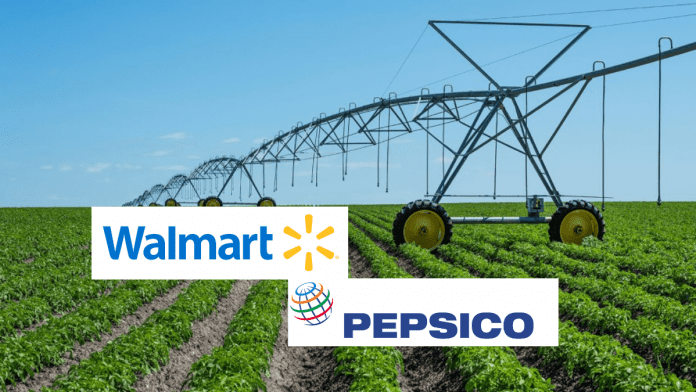News in brief: PepsiCo and Walmart will invest $120 million over 7 years to support farmers in the US and Canada, focusing on regenerative agriculture to improve soil health and water quality. The collaboration aims to enable regenerative practices on over 2 million acres of farmland, reducing 4 million metric tons of greenhouse gas emissions by 2030.
Food and beverage giant, PepsiCo, and leading retail superstore, Walmart, have announced a funding collaboration for farmers in the United States and Canada. The duo seek to support farmers in improving soil health and water quality through regenerative agriculture with an investment of $120 million over a 7-year period.
In a press release, Walmart said the partnership aims to enable and accelerate regenerative agriculture practices adoption on more than 2 million acres of farmland. It is projected to help reduce and remove 4 million metric tons of greenhouse gas emission by 2030.
The companiesâ businesses depend on farmers growing raw materials used to make their products. They boast of a supply chain that cuts across North America and involves a large volume of critical crops such as potatoes, oats, corn, wheat, soybeans and rice.
The collaboration should offer a voluntary flexible approach to regenerative agriculture that gives farmers representation at decision tables. Also, they are making the investment because they recognise that agriculture will remain diverse, the public announcement says.
PepsiCo Chief Sustainability Officer, Jim Andrew, affirmed that farmers need the economic, social and cultural support for regenerative agriculture to make sense. He adds that the collaboration with Walmart will advance mutual goals to help farmers as they transform farming in a way that benefits the planet and people.
Walmartâs Senior Vice President for sustainability, Jane Ewing, also shared similar sentiments. She maintains that the collaboration with PepsiCo is an example of how the retailer prioritises regenerative agricultural practices expansion among farmers across North America. In addition, she mentioned the funding will elevate farmers’ livelihoods.
Encouraging others to join and staying on course with climate goals
Other benefits that this investment could bring include increasing yields, education, upfront investment in outcomes, peer coaching, cost-sharing and creating a model for other product categories. The companies also expect that the move will encourage other brands to make investments in regenerative agriculture as well.
PepsiCo’s individual responsibility agenda includes driving the adoption of regenerative agriculture practices across 7 million acres and reducing absolute GHG emissions by more than 40% across its entire value chain by 2030. This effort is a new model for the multinational food corporation, marking their first large-scale strategic collaboration focused on sustainable agriculture with a retail partner.
For Walmart, the retail giant says the effort is in line with its goal to protect, restore or more sustainably manage 50 million acres of land and 1 million square miles of ocean by 2030.



